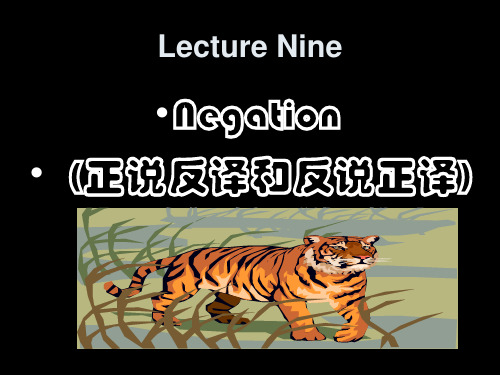第九节 正反、反正翻译法
英汉互译中的正反反正表达法

英汉互译中的正反反正表达法在英汉互译过程中,由于两种语言表达习惯不同,往往需要把英语中的正说译成汉语中的反说,把英语中的反说译成汉语中的正说,或反之,这样才能确切表达原意并符合语言的规范。
这种把正说处理为反说,把反说处理为正说的译法,叫正反、反正表达法。
这种正说和反说的相互转换是翻译技巧中的一个重要方法。
它属于引申和修辞范围。
那么,什么是正说和反说呢?英语词句中含有“never”,“no”,“not”,“non-”,“un-”,“im-”,“in-”,“ir-”,“-less”等成分以及汉语词句中含有“不”、“没”、“无”、“未”、“甭”、“别”、“休”、“莫”、“非”、“毋”、“勿”等成分的为反说,不含有这些成分的为正说。
正说和反说包括的词类范围很广,不仅包括动词、形容词、副词、名词、介词和连词,而且包括各种词组,短语和从句。
现以实例对正反、反正表达法加以说明。
一、英译汉正说反译法在不少情况下,由于有的词语含有特殊意义,如不从反面着笔,译文就不通,这时必须反说。
例如:1)“I have read your articles.I expect to meet an old man.”“我读过你的文章,没想到你这样年轻。
”(动词)2)He was absent from his own country last year.他去年不在自己的国家。
(形容词短语)3)He dived into the water fully clothed and rescued the children.他衣服没脱就跳入水中,把孩子救了上来。
(副词)4)He was extremely sorry for the shortness of time.他对时间不足感到十分抱歉。
(名词)5)I do think that it is beyond his power to fulfill the task.我的确认为要完成这项任务是他力所不及的。
英汉翻译(9)正反译法

• 6) Herb may be dying somewhere, calling out for his mum and dad, and only strangers round him. • 哈伯在某处正在死去,哭爹喊娘的,可身边没有 一个亲人。 • 7) All night long the beating and questioning goes on, the search goes on. • 整夜拷打不断,审讯不断,搜查不断。 • 8) I've read your articles, I expected to meet an older man. • 我拜度过您的大作,没想到您那么年轻。
• • • •
• • • • • • •
ห้องสมุดไป่ตู้
Affirmative-negative-transformation of propositions 1) Socialism is beyond doubt superior to capitalism. 社会主义制度无疑优于资本主义制度。 2) I'm very much surprised when the volunteers gave us cigarettes instead of killing us. 志愿者给我们烟抽而不杀我们时,我感到吃惊。 3) There is one great issue in the balance here today. 今天,这儿有一个悬而未决的大问题。 4) Under fifty people were there. 那儿不足50个人。 5) His answer is beside the mark. 他的回答文不对题。
• • • •
•
• • • •
第九讲 正译与反译(negation)

从广义上说,任何反说转正说 和正说转反说以及任何相反概念 的转译都属于这种译法。如 hunger march----反饥饿游行, terror war-----反恐战争,dust mask---防尘罩,tear test----抗拉扯 实验, the head of the story---故事 的后面等都属于广义的正反译法。
• 5.短语 • 1)Don’t lose time in posting this letter. • 赶快把这封信寄出去。 • 2)The examination left no doubt that the patient had died of cancer. • 调查的结果清清楚楚说明病人死于癌症。 • 3)Students, with no exception, are to hand in their papers this afternoon. • 今天下午学生统统要交书面作业。 • 6.句子 • 1)Such fights couldn’t long escape notice. • 这类飞行迟早要会被人发觉的。 • 2)Ashurst saw at once that Phil was not all right. • 艾舍斯特马上看到菲尓出了毛病。
• • • • • • •
4.前置词 1)This problem is above me. 这问题我不懂。(或:我解决不了)。 2)ห้องสมุดไป่ตู้t was beyond his power to sign such a contract. 他无权签订这种合同。 6.名词 1)By about six-thirty the sounds of aircraft, trucks and tanks had become quite familiar, but a series of small explosions nearby seemed cause for new anxiety. • 大约到六点半,大家对飞机、卡车和坦克的声音 已经很习以为常了。但是附近一些轻微的爆炸声似 乎又造成了新的不安。
正反、反正表达法

3 返回章重点 退出
1. You cannot be too careful when you drive a car.
你开车要十分小心。 2. He is no richer than I.
他和我一样穷。 3. There is nothing like health.
anxiety at a loss be fatally ill failure life sentence safe and sound Soon staff only
wet paint keep upright keep off the grass
焦虑不安 不知所措 不治之症 不成功 无期徒刑 安然无恙 不久
It is good workman that never blunders. 智者千虑,必有一失。
17 返回章重点 退出
例4: She refrained from laughing. 【译文】她忍住没有笑。 例5:The thick carpet killed the
sound of my footsteps. 【译文】我走在厚厚的地毯上一点儿声
我们只做右撇子鸡〔要吃左撇 子鸡请去麻荡老〕
正确译文:炸鸡,我们真不赖! 6
返回章重点 退出
滴滴香浓,意犹未尽
7 返回章重点 退出
正反、反正表达法
Affirmative & Negative Expressions in Translation
表达转换译法亦称“正说反译法〞、“正反译法 〞、“反正、正反表达法〞,即以“正〞译“反〞或 以“反〞译“正〞来表达原语的内容。
正反、反正表达法
Affirmative & Negative Expressions in Translation
课件9_正反译法

manifested a strong dislike for his father’s business. 他对父亲的生意表现出强烈的厌恶情绪。 I watched with disbelief as a number was put on my arm--- 82525. 我疑惑地看着刺在我的手臂上的一个号码 -82525 。
More examples
We believe that the younger generation will prove worthy of our trust. 我们相信年轻一代不会辜负我们的信任。 When Philip missed the last bus, he was at a loss to know what to do. 菲利普误了最后一班车,不知该怎么办了。 Both sides thought that the peace proposal was the one they could accept with dignity. 双方认为,他们可以不失体面地接受该和平建议。
More examples
I
do not want everything. I do not want anything. 我并不是什么都要。 我什么都不要。
4.特指否定
We cannot be too careful in doing experiments. 我们做试验越小心越好。 Your temper is more than I can bear. 我受不了你的脾气。 You ought to know better than to do that sort of things. 你不该做那样的事情。 The little bridge is anything but safe. 这小桥一点也不安全。
句子的翻译-正反法

c. 形容词和形容词短语:few, little, free from, far from, safe from, short of等等
这次演出根本没有失败,而是十分成功。
The show was far from being a failure; it was a great success.
13
把马克思主义的普遍真理同我国的具体实 际结合起来,走自己的道路,建设有中国 特色的社会主义,这就是我们总结长期历
史经验得出的基本结论。
To integrate the universal truth of Marxism with the concrete realities of China, blaze a path of our own and build socialism with Chinese characteristics — —this is the basic conclusion we have reached in summing up the long historical experience.
句子的翻译-正反法
1
正反——反正翻译法
英语和汉语均有从正面或反面来表达一种 概念的现象。如果原文从反面表达直译出 来不合乎译语习惯,就可考虑从正面表达, 反之亦然。使用哪种方法,主要看译语表 达习惯及修辞效果而定。
2
正——反翻译法例句: Herb may be dying somewhere, calling out for his mum and
他显然有不同的想法。 He evidently thinks otherwise. 我根本不知道他会遇到什么麻烦。 I little knew what trouble he was going to
9正反翻译法
9正反翻译法正反翻译法B练习一(1)If the weather holds a couple of days, the team of the explorers will set off.假如天气三两天里保持不变,探险队就出发。
(2) The Foreign Minister doubted the desirability of a negotiation to be held at this time.外交部长认为此时举行谈判并无必要。
(3) John dived into the water fully clothed and rescued the old lady.约翰没有脱衣服就跳入水中并救出了那个老太太。
(4) The soldiers would rather fight to death before they surrendered.战士们宁愿战斗到死而决不投降。
(5) While trade is good, money is very tight at present.尽管生意不错,但目前资金仍然十分紧张。
(6) The rocket traveling in space is free from the earth’s gravity.在太空飞行的火箭不受地球引力的控制。
(7) In the event of any contingencies beyond our control, we shall not be held responsible for the late delivery of the goods.如果发生我们无法控制的意外事故,我方对迟交货物不负责任。
(8) Cowards die many times before their death; the valiant never taste of death but once.怕死鬼还没死就死了许多次,而勇敢者只死一回。
正反、反正表达法(翻译技巧)
正反、反正表达法(翻译技巧)Negation在语法与翻译两个不同学科中含义不尽相同。
Negation 作为一种翻译技巧,它主要指在翻译实践中,为了使译文忠实而合乎语言习惯地传达原文的意思,有时必须把原文中的肯定说法变成译文中的否定说法,或把原文中的否定说法变成译文中的肯定说法。
因此,翻译技巧中的Negation译成“正说反译、反说正译法”是比较合适的。
而语法中的Negation则译成“否定”,因为它是指下面四种语言现象:1.Full negative(完全否定);2. Absolute negative(绝对否定);3. Semi negative(部分否定) ;4. Words, or phrases, with negative implication(含否定意义的词或短语)。
前两种否定,除少数情况外,英语汉语中差别不大;而后两者否定,在英汉两种语言的运用中则差别较大,需要特别注意。
从下面的例句中,可以体会“正说反译,反说正译”在翻译中使用的一些情况。
1.I don’t think Tom is correct.我认为汤姆不对。
(不译成:我不认为汤姆是不对的)2.我想小李明天不会来了。
I don’t think Xiao Li will come tomorrow.(不译成:I think Xiao Li won’t come tomorrow.)3. A: Are you not going tomorrow?B. No, I’m not going.甲:你明天不去吗?乙:是的,我不去。
4. ①Africa is not kicking out Western Imperialism ②in order to invite other new masters.①非洲踢出西方帝国主义②并不是为了请进其他新的主子。
(假如不运用“正说反译,反说正译”这一技巧,译文就会成为:“非洲不踢出西方帝国主义为了请进其它新的主子。
Lecture 9 Affirmation and Negation
9.4 正反译法的作用
正反译法是一个很有用的翻译技巧,虽然说 法变了,意思保持不变。之所以要改变,主 要是由于词语之间的关系、句式的变化、习 惯表达等方面的因素。“正话反说,反话正 说”是提高译文水平的有效方法之一。
A. 肯定译否定,更能传神达意 例1:In the high altitude snow and ice remain all the year. 【译文】海拔高的地方,冰雪常年不化。 例2:The explanation is pretty thin. 【译文】这个解释很不详细。 例3:Slips are scarcely avoidable when you’re new to your work. 【译文】工作没有经验,出点差错,在所难免。
反说/否定:英语中带no, not, none, nothing, nowhere, nobody, never, neither, nor等否定 词,或non-, un-, im-, in-, ir-, dis-, non-, less等否定词缀的词句, 汉语中含有“不” 、“没有”、“无”、“非”、“未”、“ 否”、“休”、“勿”、“别”、“莫”、 “毋”等成分的词句。 正说/肯定:英汉语中不含这些成分的词句。
练习
1.She was refused admittance by them. 【译文】他们不让她进去。 2.His noble deeds are above all praise. 【译文】他的高尚行为是赞扬不尽的。 3.The mistake escaped me. 【译文】我没注意到这个错误。 4.The truth is quite other than what you think. (other than = not, anything but) 【译文】事实真相与你想的完全不同。
正反译法L9新编英汉翻译教程课件lect
9.1 反译法:正话反说与反话正说 反译法: 9.1.1 英汉语言表达否定的差异。 英汉语言表达否定的差异。 1,汉语表达否定意义的词语中含有明显的 汉语表达否定意义的词语中含有明显的 否定标志词: 否定标志词:不、无、非、莫、勿、未、 没有等。 否、别、没有等。
2,英语的否定标志:否定词缀:dis-、il-、 英语的否定标志:否定词缀: 英语的否定标志 、 、 in-、non-、un-、less 、 、 、 表形式肯定、意义否定的各类词: 表形式肯定、意义否定的各类词:fail, deny, miss, lack, ignore, but, except, beyond 和 短语: 短语:instead of, in place of 结构形式: 结构形式:more…than, other than…,rather than…等。 等
2. 反说正译法:
源语从反面表达, 译语从正面表述。
She is no fool. 她很精明。 This material does not wear out. 这种料子很耐穿。
百闻不如一见 Seeing is believing 没有不透风的墙 Walls have ears
(1).反正译:英语从反面表达,汉语从正面 表达 反正译是用变换语气的方法把原文的否定式 译成汉语的肯定式。翻译时恰当地运用这一 方法可以使译文自然流畅。英语中的 “not...until”结构和双重否定结构常用这 种方法来翻译,另外,“no less than”, “no more than”,“nothing but”, “cannot...too”等含有否定词语的结构也 常用反正译的方法来表达。
4、恐怕这些调查工作是白做了。 I’m afraid that these investigations were done for nothing. 5、在白天看来,它们就平凡的很。 By daylight, they were nothing out of the common.
